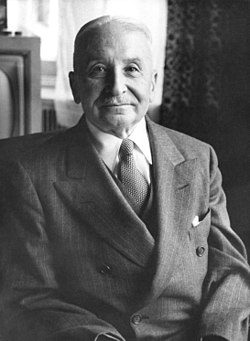Ludwig von Mises Quote
Granted, many of them replied, that socialism may not result in riches for all but rather in a smaller production of wealth; nevertheless the masses will be happier under socialism, because they will share their worries with all their fellow citizens, and there will not be wealthier classes to be envied by poorer ones. The starving and ragged workers of Soviet Russia, they tell us, are a thousand times more joyful than the workers of the West who live under conditions which are luxurious compared to Russian standards; equality in poverty is a more satisfactory state than well-being where there are people who can flaunt more luxuries than the average man.
Granted, many of them replied, that socialism may not result in riches for all but rather in a smaller production of wealth; nevertheless the masses will be happier under socialism, because they will share their worries with all their fellow citizens, and there will not be wealthier classes to be envied by poorer ones. The starving and ragged workers of Soviet Russia, they tell us, are a thousand times more joyful than the workers of the West who live under conditions which are luxurious compared to Russian standards; equality in poverty is a more satisfactory state than well-being where there are people who can flaunt more luxuries than the average man.
Related Quotes
The 10 ever greatest misplacements in life:1. Leadership without character.2. Followership without servant-being.3. Brotherhood without integrity.4. Affluence without wisdom.5. Authority without consc...
When my son speaks of playing sports, I've always told him: playing on the team is great, but aspire to be the guy who owns the team. I've always told my son: most of the guys on the team will end up...
I don't want to be around people who accept me as is, in my unrefined state of becoming. I consistently want people around me who push and encourage me to be my ultimate best, who bring out the inner...
There's poverty in wealth. If a man is wealthy without good health, is he not poor? If a man is wealthy without children, is he not poor? If a man is wealthy without God, is he not poor? If a man is w...
About Ludwig von Mises
Mises emigrated from Austria to the United States in 1940, fleeing from Nazis who on the first day the German Army entered Vienna rushed into the von Mises apartment in Vienna, apparently looking for him, and confiscated his library and papers. Mises was in Geneva, Switzerland at the time, but when the German invasion of France was about to leave Switzerland completely surrounded by Fascist and Nazi controlled territory, von Mises and his wife found it necessary to flee through France dodging German troops, to get to the US via Spain and Portugal.
Since the mid-20th century, both libertarian movements and the field of economics as a whole, have been strongly influenced by Mises's writings. Mises's student Friedrich Hayek viewed Mises as one of the major figures in the revival of classical liberalism in the post-war era. Hayek's work The Transmission of the Ideals of Freedom (1951) pays high tribute to the influence of Mises in the 20th-century libertarian movement. Economist Tyler Cowen lists his writings as "the most important works of the 20th century" and as "among the most important economics articles, ever".
Mises's Private Seminar created a leading group of economists. Many of its alumni, including Friedrich Hayek and Oskar Morgenstern, emigrated from Austria to the United States and Great Britain. Mises has been described as having approximately seventy close students in Austria.
Mises received many honors throughout the course of his lifetime—honorary doctorates from Grove City College (1957), New York University (1963), and the University of Freiburg (1964) in Germany. His accomplishments were recognized in 1956 by his alma mater, the University of Vienna, when his doctorate was memorialized on its 50th anniversary and "renewed", a European tradition, and in 1962 by the Austrian government. He was also cited in 1969 as "Distinguished Fellow" by the American Economic Association.
